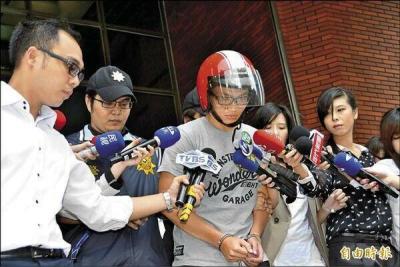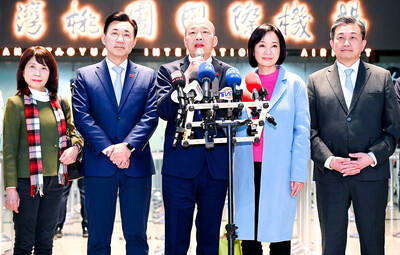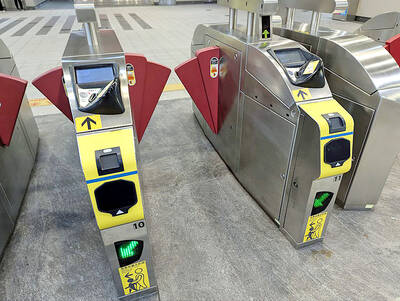The Ministry of Justice (MOJ) yesterday promised to temporarily suspend the demolition of the Huaguang Community (華光社區) in Taipei while the city government evaluates the remains of the former Taihoku Prison at the site.
“We will patiently wait and suspend the demolition work while the city reviews whether the remains of the former prison have historic value,” ministry official Lu Che-ko (盧哲科) told a press conference at the legislature in Taipei.
At the press conference, Democratic Progressive Party Legislator Pasuya Yao (姚文智) and members of the Taiwan Association of University Professors (TAUP) voiced their concerns over historic relics at the site.
A Taipei City Government Cultural Assets Review Committee meeting about the site is scheduled to be held on Monday.
“Several buildings in the community have temporarily been designated historic by the Taipei City Government, therefore the MOJ should stop its demolition work until the review committee comes to a final decision,” Yao said. “I would propose preserving not only the historic buildings, but also the green areas, which could be connected to neighborhoods around Yongkang Street and National Taiwan Normal University to make it an area of interest to tourists, with culture and a green belt.”
“We’ve always stayed in touch with Taipei’s Department of Cultural Affairs to make sure our demolitions do not harm historic buildings or trees,” Lu replied.
TAUP chairman Lu Chung-chin (呂宗津), an electrical engineering professor at National Tsing Hua University, said that preserving historical assets is far more important than development.
“The former Taihoku Prison bears witness to the struggles of Taiwanese during the Japanese colonial period,” said Chuang Wan-shou (莊萬壽), emeritus professor at Chang Jung Christian University’s Graduate Institute of Taiwan Studies. “This is the prison in which many people were jailed — including Chiang Wei-shui (蔣渭水) who led the resistance movement.”
Huaguang Community was once dormitories for prison employees during the Japanese colonial period. Although most of the prison complex was torn down, many individual buildings still stand.
When refugees and troops fled to Taiwan with the Chinese Nationalist Party (KMT) regime in 1949, many were unofficially allowed to take up residence in the area.
However, a decade ago the government decided to develop the area into a financial and commercial district, and the ministry, which took over ownership of the land from the Japanese colonial government, filed lawsuits against the residents.

Death row inmate Huang Lin-kai (黃麟凱), who was convicted for the double murder of his former girlfriend and her mother, is to be executed at the Taipei Detention Center tonight, the Ministry of Justice announced. Huang, who was a military conscript at the time, was convicted for the rape and murder of his ex-girlfriend, surnamed Wang (王), and the murder of her mother, after breaking into their home on Oct. 1, 2013. Prosecutors cited anger over the breakup and a dispute about money as the motives behind the double homicide. This is the first time that Minister of Justice Cheng Ming-chien (鄭銘謙) has

BITTERLY COLD: The inauguration ceremony for US president-elect Donald Trump has been moved indoors due to cold weather, with the new venue lacking capacity A delegation of cross-party lawmakers from Taiwan, led by Legislative Speaker Han Kuo-yu (韓國瑜), for the inauguration of US president-elect Donald Trump, would not be able to attend the ceremony, as it is being moved indoors due to forecasts of intense cold weather in Washington tomorrow. The inauguration ceremony for Trump and US vice president-elect JD Vance is to be held inside the Capitol Rotunda, which has a capacity of about 2,000 people. A person familiar with the issue yesterday said although the outdoor inauguration ceremony has been relocated, Taiwan’s legislative delegation has decided to head off to Washington as scheduled. The delegation

TRANSPORT CONVENIENCE: The new ticket gates would accept a variety of mobile payment methods, and buses would be installed with QR code readers for ease of use New ticketing gates for the Taipei metro system are expected to begin service in October, allowing users to swipe with cellphones and select credit cards partnered with Taipei Rapid Transit Corp (TRTC), the company said on Tuesday. TRTC said its gates in use are experiencing difficulty due to their age, as they were first installed in 2007. Maintenance is increasingly expensive and challenging as the manufacturing of components is halted or becoming harder to find, the company said. Currently, the gates only accept EasyCard, iPass and electronic icash tickets, or one-time-use tickets purchased at kiosks, the company said. Since 2023, the company said it

A tourist who was struck and injured by a train in a scenic area of New Taipei City’s Pingsi District (平溪) on Monday might be fined for trespassing on the tracks, the Railway Police Bureau said yesterday. The New Taipei City Fire Department said it received a call at 4:37pm on Monday about an incident in Shifen (十分), a tourist destination on the Pingsi Railway Line. After arriving on the scene, paramedics treated a woman in her 30s for a 3cm to 5cm laceration on her head, the department said. She was taken to a hospital in Keelung, it said. Surveillance footage from a